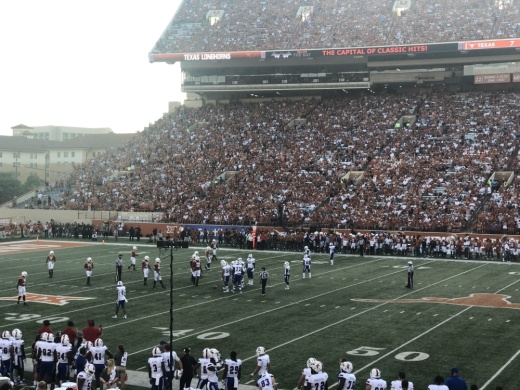A bill that passed both chambers of the Texas Legislature and went to the desk of Gov. Greg Abbott June 1 would allow athletes to receive payments for their names, images and likenesses, or NIL, in a move state lawmakers say is an attempt to keep up with the shifting tides of athletic recruiting nationwide.
Senate Bill 1385, authored by state Sen. Brandon Creighton, R-Conroe, would not allow athletes to be paid directly for participation in sports, but they would no longer be prevented under NCAA rules to profit off of endorsement deals and commercial opportunities.
Emily Sparvero, an assistant professor at UT’s College of Education who focuses on sports management, said the change likely will have the biggest initial impact on social media, where athletes will now have the ability to monetize their large followings.
“The way high school students are growing up, people don’t watch TV anymore. In some ways, it’s giving [athletes] the opportunity to take advantage of those social media outlets,” she said. “It’s a natural outgrowth of the work they’re doing to build their brand.”
Creighton said in an April 7 meeting of the Senate Committee on Higher Education that he was initially a "skeptic" of the bill, but changed his mind once he understood the disadvantage Texas college athletes would face if the law did not pass. At least a half dozen other states, including Alabama, Florida and Mississippi, are set to enact similar NIL laws on July 1.
"Right now, the pressure on the state legislatures is the pressure to keep up with the Joneses and make sure their states are positioned to be competitive in attracting students—or at least not put them at a disadvantage," Sparvero said.
Janell Fitzgerald, who just finished her junior year at Texas State University, where she was named a first-team selection of the All-Sun Belt Conference volleyball team, spoke to legislators in May about the potential benefits to athletes.
Fitzgerald, who has more than 60,000 followers on the social media app TikTok according to student newspaper The University Star, told members of the Texas House she has had to turn down potential sponsorship opportunities from a local dentist's office and a water bottle company.
"As a student athlete who has a large social media following, I have to turn down multiple offers that would have helped me financially and would have benefited my personal brand through networking leading into post-graduation," Fitzgerald said.
The ability for athletes to accept those sponsorship deals will likely mean little when it comes to the bottom line for university athletic departments, Sparvero said. Athletes can only profit off their own name, image and likeness—not the university's—and it is unlikely many companies will want to stop working with legacy institutions such as UT or Texas A&M University due to the change.
"Financially for athletic departments, the impact is very small and the change is very small," she said.
UT Athletic Director Chris Del Conte also spoke to members of the Texas House of Representatives in May to support the bill. Del Conte said allowing athletes to monetize their own name, image and likeness is a valuable and much-needed change—one he did not have when he was a track and field athlete at the University of California Santa Barbara.
"I wish I had that opportunity," Del Conte said. "My scholarship only paid for room and board. I had no extra change."
While no federal laws have been passed regarding NIL, lawmakers in Washington are discussing changes at the broader level that would negate the need for a patchwork of state reforms. The U.S. Senate held a hearing June 9 to address proposals in front of federal lawmakers, which included testimony from NCAA President Mark Emmert, Gonzaga University men's basketball coach Mark Few and Wayne Frederick, president of Howard University.





